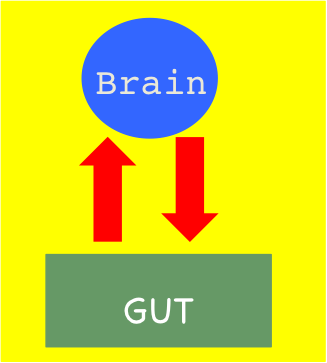The gut and the brain
 We don’t normally think about the gut and the brain being connected. And yet many of us have gotten a stomach ache, nausea or diarrhea from stress or a feeling of “butterflies” from excitement. Or we may experience pleasure from certain foods or feel a need to eat when under stress.
We don’t normally think about the gut and the brain being connected. And yet many of us have gotten a stomach ache, nausea or diarrhea from stress or a feeling of “butterflies” from excitement. Or we may experience pleasure from certain foods or feel a need to eat when under stress.
The vagus nerve travels between the brain and other organs in the body and can transmit messages in both directions. The brain can send messages to the gut through chemicals (called neurotransmitters). The gut has its own nervous system (called the enteric nervous system or ENS) that controls digestion. But scientists now think that the ENS can also produce neurotransmitters to send to the brain.
The big question is whether the gut can actually cause symptoms and diseases of the nervous system.
In a recent article in the NY Times, Moises Velasquez-Manoff writes about the possible connection between celiac disease and the brain. Celiac disease is a disease of the gut in which patients get severe inflammation and discomfort from eating gluten. Gluten is a protein that is found in wheat, but can also be found in other grains such as barley and rye. Some patients with celiac disease also experience a range of symptoms of the nervous system (like seizures, dementia, etc.) that get better when they are put on a gluten-free diet. Velasquez-Manoff is careful to point out that this is just an observation and that a lot more research is needed to figure out if the disease in the gut is causing the nervous system symptoms.
New research suggests that the organisms that live in the gut can cause changes in the brain. There are trillions of bacteria (along with viruses, parasites and other organisms) in the gut and together they are called the microbiome. One way these bacteria could affect the brain is by making neurotransmitters like the ones made in the brain. In mice, scientists have found that they can make symptoms of autism go away by feeding the mice a type of bacteria called Bacterioides fragilis. On November 19, 2014 a group of scientists who study the nervous system got together to discuss the relationship between the microbiome and the brain in a conference called Gut Microbes and the Brain: Paradigm Shift in Neuroscience.
In addition to autism, scientists are studying whether bacteria in the gut can influence the development of other mental health problems including anxiety, depression, and Alzheimer’s disease. Some people with nervous system diseases also have symptoms in their guts. Researchers are studying whether certain bacteria in the gut produce chemicals that cause the brain to develop these diseases. But it is also possible that the nervous system problems are causing the bacteria in the gut to change or that both problems are caused by something else.
The next question is can we influence the development of these nervous system problems by altering the bacteria in the gut? Can we do so by eating the right foods or by taking probiotics?
Unfortunately, it’s too soon to tell.
0 thoughts on “The gut and the brain”